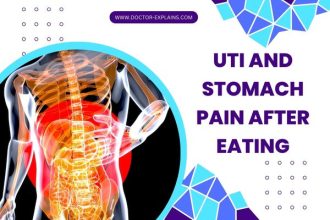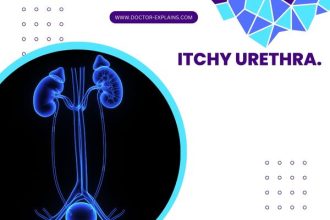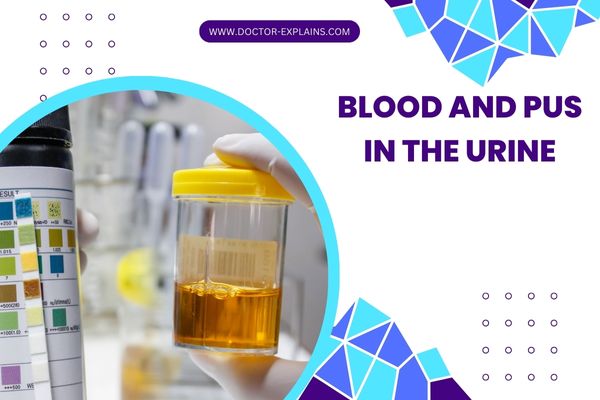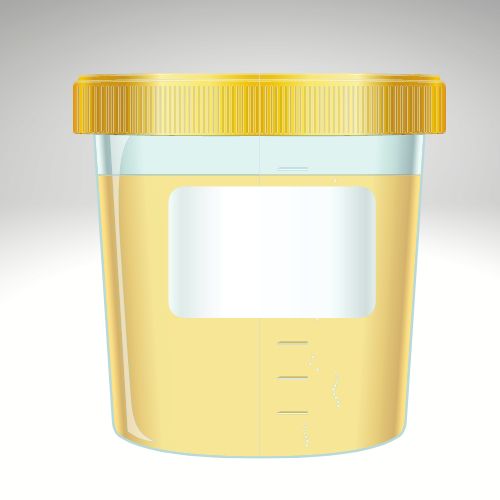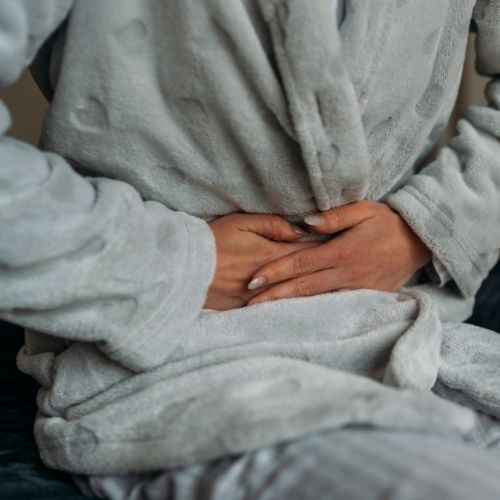A kidney infection, or pyelonephritis, is a type of urinary tract infection (UTI) that occurs when bacteria enter the kidneys.
It typically causes symptoms like fever, urinary changes, and lower back or side pain.
But can it cause chest pain?
This article will provide a detailed look at the link between kidney infection and chest pain, possible explanations, and treatments.
The short answer:
While kidney infections typically cause pain in the lower back or side, they can indirectly lead to chest pain through various complications and associated conditions. Urosepsis, medications’ side effects, and associated hydronephrosis may induce chest pain with a kidney infection.
What you need to know:
- A kidney infection is a complicated urinary tract infection that may lead to serious health issues.
- The typical kidney infection pain is in the flanks and the costovertebral angle (in the upper back, below the rib cage, and just beside the vertebral column).
- Chest pain is not typical with a kidney infection. However, it can occur.
- Chest pain can be due to the kidney infection pain itself, generalized muscle aches (systemic symptoms of kidney infection), or other causes.
Kidney Infection: The Basics and Typical Location
Kidney infections, or pyelonephritis, are a type of urinary tract infection that can be categorized into two main types:
Uncomplicated vs. Complicated Kidney Infections
- Uncomplicated Kidney Infections: These are common and usually respond well to treatment with antibiotics. Symptoms may include fever, frequent urination, and lower back or side pain.
- Complicated Kidney Infections may require more intensive care, often involving hospitalization. Complicated infections may occur in people with underlying health conditions or structural abnormalities in the urinary tract.
Signs of Complicated Kidney Infection
- High fever
- Persistent pain
- Blood in urine
- Nausea and vomiting
- Confusion or other neurological symptoms
Typical Kidney Pain Locations
- Lower Back: This is the most common location for kidney pain, often described as a dull ache.
- Sides Below the Rib Cage: Pain may also be felt on the sides, radiating towards the front of the body.
Referred Kidney Pain Locations
- Middle of the Back: The pain may radiate to the middle of the back.
- Lower Abdomen: Pain may also be felt in the lower abdomen, especially if the infection affects both kidneys.
Pyelonephritis and Sepsis from Kidney Infection: How They Are Linked to Chest Pain
A severe kidney infection can lead to sepsis, a life-threatening response to infedoesn’tSepsis can affect various organs, including the lungs, leading to conditions like pleurisy, which causes chest pain.
Can a Kidney infection cause chest pain?
Kidney pain (often due to kidney infection or kidney stones) doesn’t typically cause chest pain. However, in rare cases, some patients may feel referred pain in the chest or under the rib cage.
A kidney infection is not a simple UTI; when the infection exceeds the urinary bladder and reaches the kidney, it causes symptoms, including kidney pain and other atypical and system symptoms.
Kidney pain location is typically in the flanks and the back (at the angle between the vertebrae and the lower part of the ribs in the back (costovertebral angle).
In some patients (particularly older), the pain may appear in atypical locations such as the lower abdomen, lower back, groin, and chest.
When your chest hurts during a kidney infection, it can be due to the kidney infection pain itself, generalized muscle aches associated with kidney infection), or other causes (see the next section).
Other causes of chest pain due to kidney infection.
1. Cardiac pain.
Causes:
Often, the heart experiences discomfort, known as angina, when there’s a decrease in blood flow. This can stem from issues like blocked coronary arteries, inflammation of the heart’s outer layer, or issues with the aorta.
Symptoms:
This discomfort can feel tight or burning, potentially spreading to the arms or jaw. Breathlessness, perspiration, and feeling lightheaded might accompany it.
Contrastindoesn’tKidney Discomfort:
Cardiac pain typically presents as a pressure or squeezing sensation in the chest, often radiating to other areas. Kidney pain is usually felt in the lower back or flank and may be sharp or dull. It doesn’t typically radiate to the chest.
Immediate Action:
Seek medical help if you experience any new or chest pain, especially if you have:
- Associated worrisome symptoms include sweating, shortness of breath, compressing pain, and jaw or left shoulder pain.
- Risk factors include previous heart attacks, smoking, being older, being male, or having a family history of coronary heart disease.
2. Sepsis from kidney infection and chest pain.
When the infection of the kidney is severe, combined with a poor immune system or older age, sepsis occurs.
Sepsis happens when the bacteria causing kidney infection (or its toxins) spreads into the bloodstream and reaches other body organs.
Sepsis is a life-threatening condition often leading to systemic symptoms, including chest pain and a kidney infection (reference).
Symptoms and signs of urosepsis include:
- Fever and chills
- Rapid heart rate
- Quick, shallow breathing
- Low blood pressure
- Confusion or drowsiness
- Reduced urine output
- Nausea and vomiting
- Pale or bluish skin
- Muscle pain (including chest wall pain).
- Shortness of breath
- Abdominal pain
- Signs of a UTI: frequent/burning urination, cloudy/bloody urine, lower abdominal or back pain.
3. Associated malaise and musculoskeletal chest pain.
Also, malaise and muscle aches can occur with severe renal infection (without real sepsis). This can also lead to chest pain during a kidney infection.
Systemic inflammation due to overactivity of the immune system releases certain chemicals (called inflammatory mediators) responsible for chest pain, fatigue, or muscle aches.
4. medication side effects.
Medications taken during a kidney infection, such as antibiotics and NSAIDs (non-steroidal anti-inflammatory drugs), can lead to generalized muscle aches or induce pill esophagitis. Both effects lead to chest pain.
Also, Some medications may induce heart attack or vibrations, such as ciprofloxacin, erythromycin, and NSAIDs (reference).
5. Anxiety and stress.
Anxiety and stress due to infection or fear of complications often build up and lead to body changes such as:
- Muscle tension.
- Increased respiration (hyperventilation).
- Fast heartbeats (palpitations).
- Increased blood pressure.
These changes contribute directly or indirectly to chest pain during a kidney infection.
Here are the common signs of anxiety during a kidney infection (reference).:
- Excessive worry
- Feeling restless
- Rapid heartbeats
- Muscle tension, muscle aches (including chest infection)
- Shortness of breath
- Trembling
- Sweating
- Constant fatigue
- Trouble focusing
- Irritability
- Sleep issues
- Stomach cramps.
- Panic attacks
- Specific intense fears
6. Pleurisy.
Pleurisy is the inflammation of the pleura, the two layers of thin tissue covering the lungs and the inside of the chest wall. Here are the symptoms of pleurisy:
Kidney infection can, in rare cases, lead to complications such as pleurisy, especially if the infection spreads or if an associated inflammatory response affects the pleura.
Here are the symptoms suggestive of pleurisy (reference):
- Sharp chest pain: This there’s worsens with breathing in, coughing, or sneezing.
- Pain that radiates to the shoulder or back.
- Shortness of breath: Due to the pain, individuals might try to breathe shallowly to avoid it.
- Cough.
- Fever and chills: If there’s an associated infection.
- Rapid breathing.
When to worry about chest pain and kidney infection?
Chest pain is not necessarily due to kidney infection. It can have a variety of causes, some of which are serious and require immediate medical attention.
Here are some situations when you should be concerned about chest pain and seek emergency care:
- Nature of Pain: Severe, crushing, or squeezing chest pain, especially if it lasts more than a few minutes.
- Radiating Pain: Pain that radiates to the shoulders, neck, jaw, arms, or back.
- Associated Symptoms: Accompanied by shortness of breath, dizziness, fainting, sweating, nausea, or vomiting.
- Sudden Onset: Chest pain that comes on suddenly, especially if there’s no clear reason (like after physical exertion).
- History of heart disease: If you have a history of heart disease, elevated blood pressure, diabetes, or multiple risk factors for cardiac disease.
- Pain with Exertion: Chest pain that occurs or worsens with physical activity.
- Unexplained Onset: Pain that doesn’t have a clear cause, especially if it doesn’t resolve quickly.
- Pain that Doesn’t Improve: If the pain doesn’t improve or change after resting or taking medications, you might have angina.
- Other Symptoms: If a feeling of impending doom, extreme anxiety, or confusion accompanies the chest pain.
- Age: Older adults, especially those over 50, should be more cautious about chest pain.
- Other Medical Conditions: Individuals with diabetes might not experience typical chest pain symptoms during a cardiac event.
- Signs of urosepsis: chills, fever, generalized muscle aches, dizziness or fainting, pus in urine, etc.
